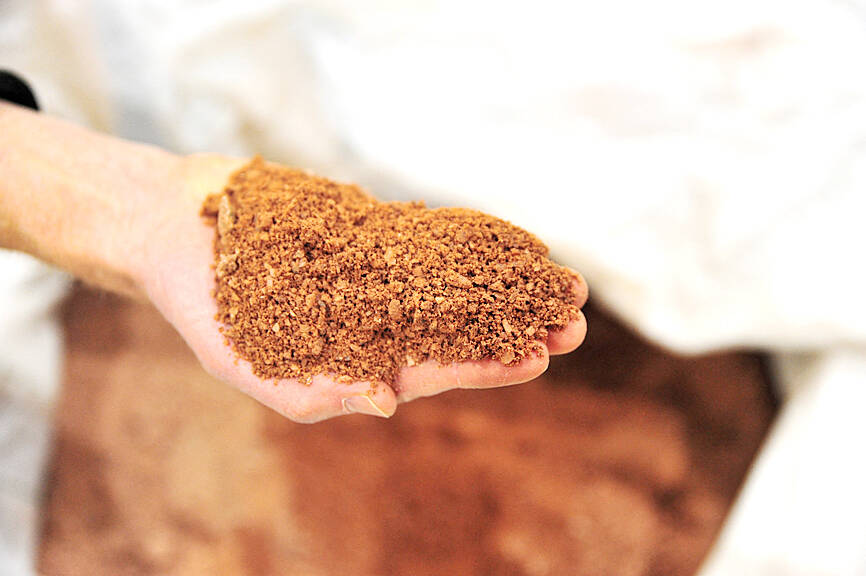Canada is making it harder for foreign firms to acquire domestic mining companies by imposing measures that could protect top takeover targets from large global rivals.
The Canadian government would only approve foreign takeovers of Canadian mining companies “in the most exceptional of circumstances,” the latest guidelines from Canadian Minister of Innovation, Science and Industry Francois-Philippe Champagne showed.
The directive issued on Thursday is part of a sweeping effort by Canadian Prime Minister Justin Trudeau’s government to protect the nation’s critical minerals sector and national security interests.

Photo: Reuters
The move appears to insulate domestic companies from takeovers when the world’s biggest mining firms are hunting for metals that underpin the global transition away from fossil fuels. Industry giants such as Glencore PLC, BHP Group Ltd and Rio Tinto PLC have all sought to boost exposure to metals like copper through major, transformational acquisitions.
Canadian mining firms, in turn, have become appealing targets. Teck Resources Ltd spent much of last year fending off Glencore’s US$23 billion takeover attempt before the Swiss company opted instead to just buy the company’s steelmaking coal business. The Canadian federal government approved the US$6.9 billion deal on Thursday, while also setting new criteria for future foreign mining deals.
“This high bar is reflective of the strategic importance of Canada’s critical minerals sector and how important it is that we take decisive action to protect it,” Champagne said in a statement.
Teck is one of the few large Canadian metals producers that survived a wave of industry takeovers, even though it has long been coveted by foreign competitors for its copper and zinc assets spread across the Americas. The Vancouver-based company is widely expected to become an acquisition target when founder and top investor Norman Keevil gives up control of the company in the coming years.
“Essentially they are saying to Glencore, don’t bother coming back for the other half of Teck,” said Canadian mining financier Pierre Lassonde, who launched a competing bid for Teck’s coal assets last year. “It looks to me like Ottawa is prepared to ring-fence the Canadian critical metals industry with this new directive.”
The new directives go even further than a crackdown on foreign takeovers from state-owned entities that began in October 2022.
Champagne’s ministry has thwarted several recent attempts by Chinese companies to make inroads in Canada’s critical minerals sector through takeovers or major investments.
However, Thursday’s comments signal that the federal government is weary of foreign takeovers even from companies in friendly nations.
Canada’s crackdown could also constrict access to capital for companies that rely on foreign investment to fund exploration and mining projects. The government is “limiting” funding to the industry with their “more aggressive statements,” National Bank of Canada metals and mining analyst Shane Nagle said. “If that’s going to be challenging to do, they’ll just go elsewhere.”

Intel Corp chief executive officer Lip-Bu Tan (陳立武) is expected to meet with Taiwanese suppliers next month in conjunction with the opening of the Computex Taipei trade show, supply chain sources said on Monday. The visit, the first for Tan to Taiwan since assuming his new post last month, would be aimed at enhancing Intel’s ties with suppliers in Taiwan as he attempts to help turn around the struggling US chipmaker, the sources said. Tan is to hold a banquet to celebrate Intel’s 40-year presence in Taiwan before Computex opens on May 20 and invite dozens of Taiwanese suppliers to exchange views

Application-specific integrated circuit designer Faraday Technology Corp (智原) yesterday said that although revenue this quarter would decline 30 percent from last quarter, it retained its full-year forecast of revenue growth of 100 percent. The company attributed the quarterly drop to a slowdown in customers’ production of chips using Faraday’s advanced packaging technology. The company is still confident about its revenue growth this year, given its strong “design-win” — or the projects it won to help customers design their chips, Faraday president Steve Wang (王國雍) told an online earnings conference. “The design-win this year is better than we expected. We believe we will win

Chizuko Kimura has become the first female sushi chef in the world to win a Michelin star, fulfilling a promise she made to her dying husband to continue his legacy. The 54-year-old Japanese chef regained the Michelin star her late husband, Shunei Kimura, won three years ago for their Sushi Shunei restaurant in Paris. For Shunei Kimura, the star was a dream come true. However, the joy was short-lived. He died from cancer just three months later in June 2022. He was 65. The following year, the restaurant in the heart of Montmartre lost its star rating. Chizuko Kimura insisted that the new star is still down

While China’s leaders use their economic and political might to fight US President Donald Trump’s trade war “to the end,” its army of social media soldiers are embarking on a more humorous campaign online. Trump’s tariff blitz has seen Washington and Beijing impose eye-watering duties on imports from the other, fanning a standoff between the economic superpowers that has sparked global recession fears and sent markets into a tailspin. Trump says his policy is a response to years of being “ripped off” by other countries and aims to bring manufacturing to the US, forcing companies to employ US workers. However, China’s online warriors